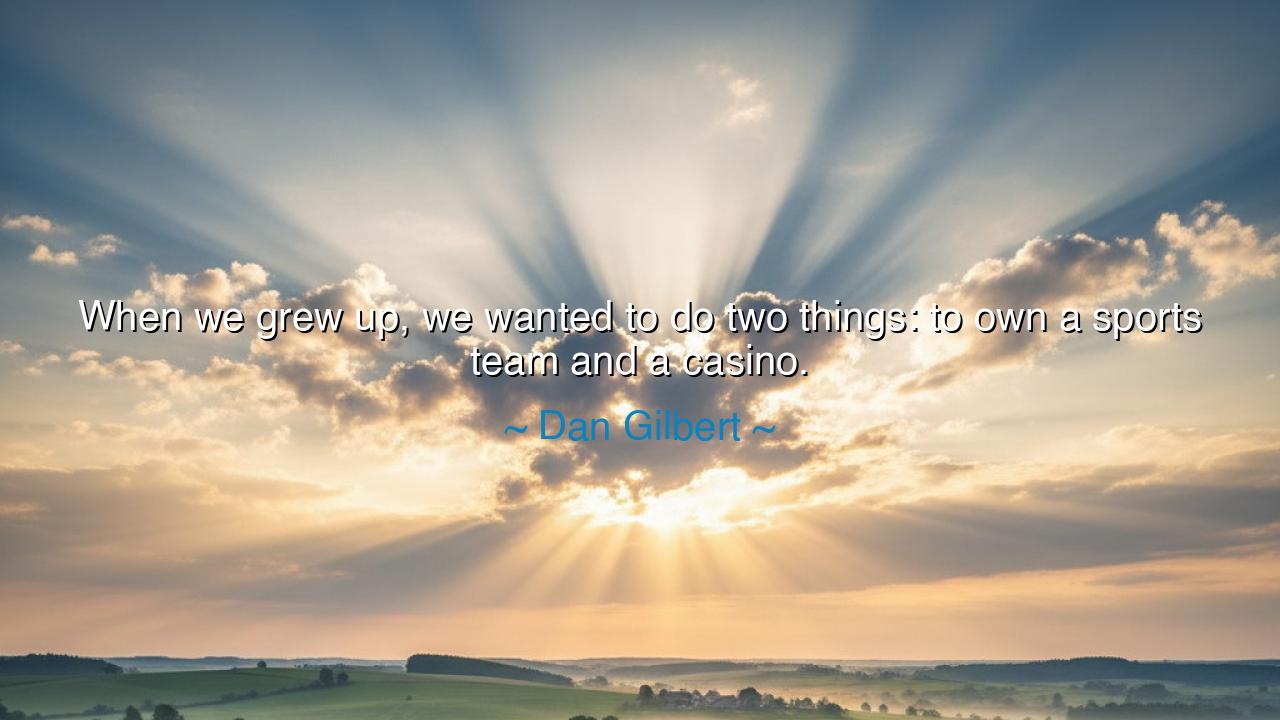
When we grew up, we wanted to do two things: to own a sports






When Dan Gilbert proclaimed, “When we grew up, we wanted to do two things: to own a sports team and a casino,” he spoke with the candor of ambition and the innocence of childhood dreams. His words reveal the hunger of the human spirit not merely to exist, but to command, to shape worlds, and to dwell in places of power and excitement. For what is a sports team, if not a gathering of warriors under a banner? And what is a casino, if not the house where chance and fortune bow to the will of its master? Together, they embody the twin desires of glory and wealth, of community and chance, of control and daring.
The ancients too dreamed such dreams. In the days of Rome, young boys would watch the chariots race in the Circus Maximus and long not only to ride, but to own the stables that held the fastest horses. Others watched the dice roll in taverns, hearing the laughter of winners and the cries of the fallen, and thought to themselves, “If I cannot master fortune, then let me master the house.” In Gilbert’s words, we hear echoes of this timeless yearning: to rise beyond the common lot and hold the reins of both spectacle and fate.
But behind this desire lies a deeper truth. To own a sports team is not only to claim wealth or status, but to inherit a living legacy of pride, struggle, and victory. The owner does not merely count coins—he becomes the guardian of a city’s hopes, the steward of heroes who carry the banner of millions. Likewise, to rule a casino is not only to profit from chance, but to command a house where men test fortune itself. It is a place of risk, of hope, of human yearning condensed into the throw of dice or the turning of cards. Together, these twin ambitions are not trivial; they are the embodiment of humankind’s longing to stand at the crossroads of destiny.
Consider the tale of Croesus, the last king of Lydia. Known for his immense wealth, he believed himself the master of fortune. Yet he also sought glory in war and spectacle, desiring both the strength of armies and the allure of riches. His reign shows both the majesty and the peril of Gilbert’s vision. For in seeking both power over men and mastery of chance, Croesus found himself tested by fate itself. He learned, as we all must, that ambition can elevate but also consume, unless tempered by wisdom.
Thus, Gilbert’s words are not only personal—they are archetypal. They remind us that each of us carries within the child who once dreamed of commanding great things. Some dreamt of thrones, others of ships, others of treasures. These dreams reveal the fire within, but it is upon the adult to shape that fire into a light that guides, not a blaze that destroys. To own is not enough; to own with purpose, with vision, with honor—this is the true challenge.
What then shall be the lesson? It is this: honor the boldness of your youthful dreams, but refine them with the wisdom of maturity. If your heart still longs for greatness, pursue it, but not as a tyrant of wealth alone. Let your ambition be tied to service, to legacy, to the upliftment of those who share in your vision. To hold a team, nurture its warriors; to hold a house of fortune, use it to build community, not ruin it. In this way, ambition becomes not vanity, but destiny fulfilled.
Practically, this means revisiting the desires of your youth and asking: what truth was hidden within them? If you once longed for a kingdom, perhaps you are meant to lead in your field. If you once dreamed of treasure, perhaps you are called to create abundance for your family and community. Do not discard your childish dreams, for they are often seeds planted by the soul. Instead, water them with wisdom, prune them with patience, and let them grow into trees that bear fruit for others as well as yourself.
Thus, in Gilbert’s confession we find a universal teaching: the dreams of youth are not foolish—they are the raw form of the destinies we may yet fulfill. To seek both sports team and casino is to seek mastery of glory and fortune alike. Let us, therefore, embrace our own wild ambitions, but carry them with the strength, humility, and vision of those who know that true greatness is not in possession alone, but in the legacy one leaves behind.






AAdministratorAdministrator
Welcome, honored guests. Please leave a comment, we will respond soon